Thanksgiving 2020 – Remain within the boundaries of truth and be thankful for whatever comes of it.
length: 70:50 - taught on Nov, 25 2020
Class Outline:
In God we find what we don’t expect and do that we hadn’t planned. “Have not entered the heart of man.”
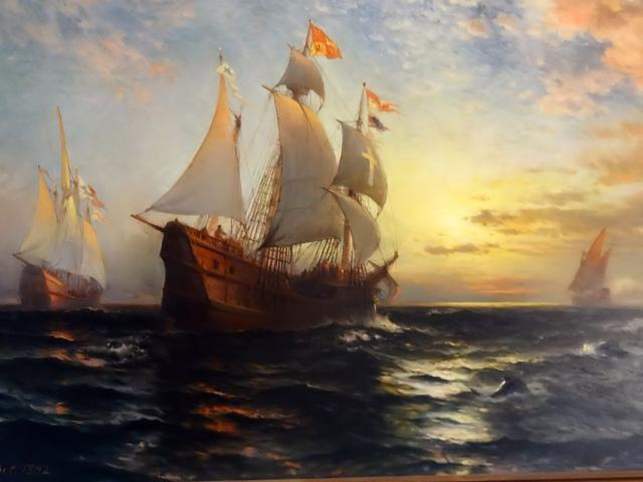
On October 12, 1492 Columbus spotted land, one of the islands of the Bahamas, which Columbus named San Salvador, meaning “Holy Savior.” But Columbus refused to believe that these lands could be anything other than the “Indies” he had counted on finding, and he accordingly called the gentle Taino natives “Indians.” He found none of the plentiful spices, jewels, gold, silver, and other precious goods that Marco Polo’s account had led him to expect. The Caribbean Islands were stunningly beautiful, but they were full of exotic plants and trees that did not correspond to anything he knew or read about. He was at least able to admit that he did not recognize them. But he was not able to imagine that he was looking at an altogether New World. In the face of all evidence to the contrary, Columbus insisted that those islands were a part of Asia. He even, on his fourth round-trip journey, looked for a straight that might take him from those “islands” to the Asian mainland, in vain, even being right around the place that would later become the Panama Canal, just a few miles from the immensity of the Pacific Ocean that he never knew was there. He returned home in disgrace and was regarded as a failure.
What a strange irony it is. He had made one of the most important discoveries in human history, and yet he didn’t quite realize it. He was never able to understand the meaning of what he had discovered. His preoccupation with finding a new way to reach the riches of the East was the force that had propelled him into a far more momentous discovery in the West, the mysterious land of mythic renewal. Columbus had trouble seeing America for the new thing that it was, and could be, and eventually would become.
It is a part of the human condition, and a recurrent feature of human history (which all common human conditions are), that what we find is not always what we were looking for, and what we accomplish is not always what we set out to do.
Again the next day John was standing with two of his disciples, 36 and he looked upon Jesus as He walked, and said, "Behold, the Lamb of God!" 37 And the two disciples heard him speak, and they followed Jesus. 38 And Jesus turned, and beheld them following, and said to them, "What do you seek?" And they said to Him, "Rabbi (which translated means Teacher), where are You staying?" 39 He said to them, "Come, and you will see."
The majesty of Christ draws some men with a unique affinity.
Christ could have told them where He was staying. He could have described it to them. But He bids them to come and see it for themselves. And by coming to see, exploring to find and experience, they would spend some memorable hours with Him.
They came therefore and saw where He was staying; and they stayed with Him that day, for it was about the tenth hour.
Search out the reality of the Christian life. Don’t remain learning about it, but explore it in life experience.
Don’t hesitate. Today is the day of deliverance. John did not hesitate that day and when writing about it, some 60 years later, he would remember it so very fondly, like it was yesterday. He likely saw this as the first day of his life. Don’t hesitate.
Neither John, Andrew, nor the others could have imagined what would happen to their lives after they found the Son of God. It would involve so much that was amazement, indescribable joy, and also terrible suffering and they would learn to give thanks for it all.
God controls history. The Pilgrims do not go to American without the Reformation and the actions of Elizabeth I preceding them. (to name a few) Be thankful for all things.
The Puritans: The Puritan Revolution in England was a result of the Reformation and the policy of Elizabeth I, one of toleration and compromise, in an attempt to establish peace in her country. They were called Puritans because they wanted to purify the Church of England that had become protestant or Calvinistic in doctrine but remained Roman or Catholic in procedure. Elizabeth had a kingdom filled with Catholics and Calvinists and Independents and even Baptists. The church was tied to the state: there was no separation. She wanted peace and the Puritans wanted a state church that was only biblical. Naturally, as is always the case in any movement that gains good momentum, not all Puritans agreed on what was biblical and there were factions among them. Some groups found no place in a nation whose goal was religious uniformity and therefore hoped for an escape from oppression by migrating to the colonies, or by founding new ones.
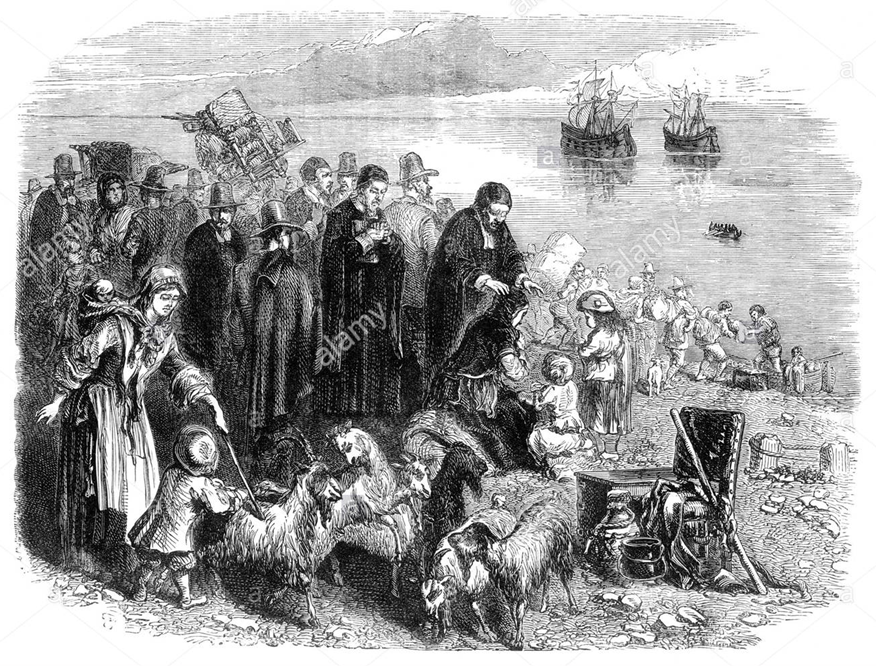
in everything give thanks; for this is God's will for you in Christ Jesus.
However, some of these dissidents were no more tolerant of differences of opinion than were the governments they fled from.
Many things may change, but the human condition of love of self and money will not. They will cause you damage - give thanks.
Give thanks to the Lord, for He is good;
For His lovingkindness is everlasting.
The stone which the builders rejected
Has become the chief corner stone.
23 This is the Lord's doing;
It is marvelous in our eyes.
History is complicated. So much of it is motivated by economic reasons, and I think that most of it is. Hence, “the love of money being the root of all evil” would be a good title for a text on the history of the world.
The colonies
Virginia:
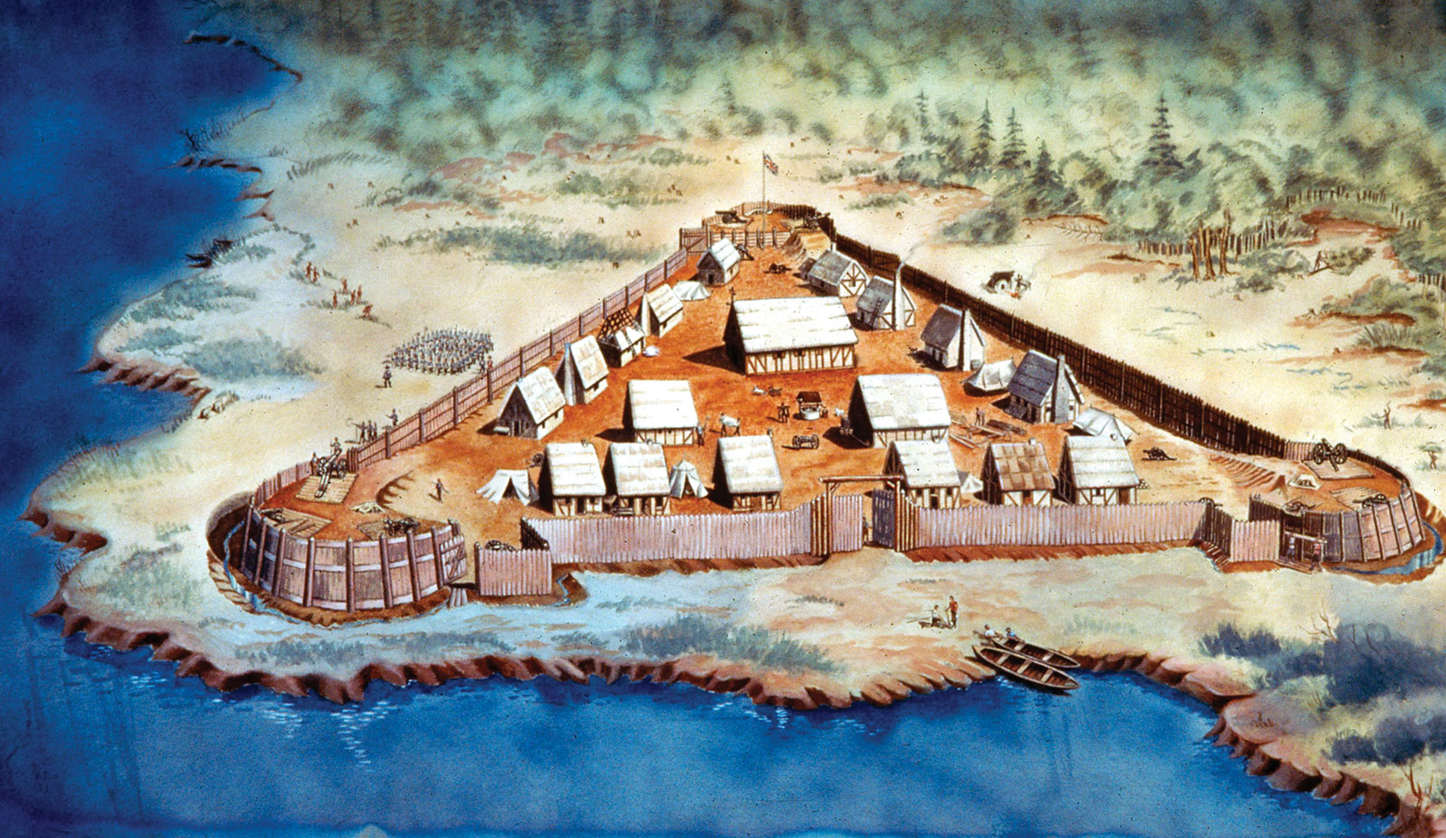
The first British colonial ventures in North America failed. In 1584, Sir Walter Raleigh, Queen Elizabeth’s favorite, was granted a royal charter for the colonization of North America. He named the area that he hoped to colonize Virginia, in honor of Elizabeth, the Virgin Queen. The first settlers of 1585 returned to England, and the second in 1587 simply disappeared.
In 1607, in the spring, 105 settlers landed near the mouth of a river they named after James I, Elizabeth’s successor, and founded Jamestown beginning the permanent colonization of Virginia.
There was a chaplain among them that hoped to establish the church of England in the settlement, offering its services to both the settlers and the Indians. Some of the stockholders of the Virginia Company were Puritan and hoped the colony would be ruled by Puritan principles. Its early laws required attendance at worship twice a day, the strict observance of the Lord’s Day, and stern punishment for profanity and immodest dress. But political realities prevailed as James detested Puritanism and would not have it in his colony. In 1624 James placed Virginia under direct rule. The colony had found success in exporting tobacco, and this required land and slaves. Slaves came from Africa and land was taken by pushing Indians inland, and these were things that the Puritans, who valued the purification of labor, found little affinity. It would be the Church of England.
One example of the love of money: There were ancient principles prohibiting Christians from holding fellow believers in slavery. So the Church did little for the conversion of slaves. If a slave was baptized a believer, it was a difficult situation for a slave master, so they outlawed the baptism of slaves. In 1667, a law was passed declaring that baptism did not change a slave’s condition - and so religion would bend to law made to bend to the love of money.
Let your character be free from the love of money, being content with what you have; for He Himself has said, "I will never desert you, nor will I ever forsake you," 6 so that we confidently say,
"The Lord is my helper, I will not be afraid.
What shall man do to me?"
Plymouth:
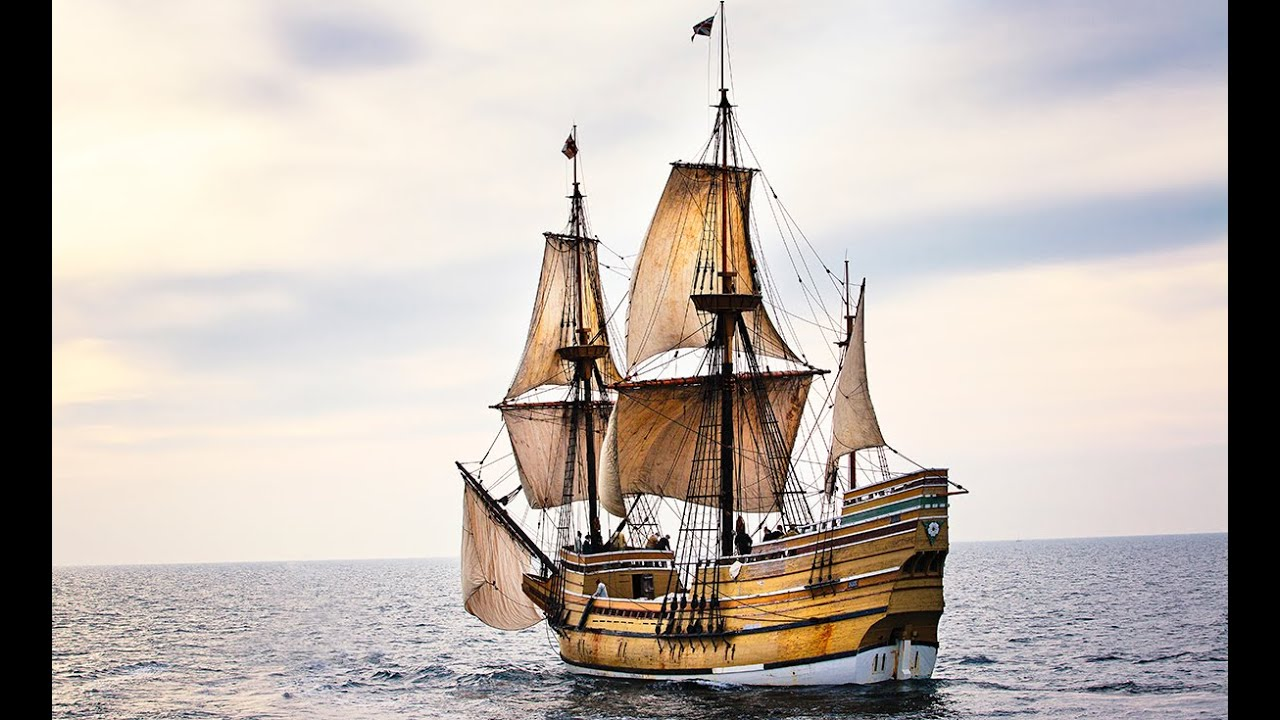
The colonies of New England had emerged, Plymouth in 1620 and then Massachusetts Bay in 1630, and were motivated, not by material considerations as Virginia, but almost entirely by religious zeal. Most of them were Puritans, men and women who believed the Church of England (a result of the Reformation and Elizabeth I) had not gone far enough to purge itself from Catholic corruptions. Most were at least comfortably middle class and thus were not impelled to undertake the perilous voyage to the New World by the spur of material need. Instead, they endeavored to make a fresh start for the life of the Christian Church, a New Zion in a new land. They understood themselves as on a divinely ordained mission, an “errand into the wilderness,” in which they would seek to create “holy commonwealths,” models for the reformation of the church they had left behind.
The Plymouth colonists, sometimes referred to as the “Pilgrims,” were a small group of Separatists who had abandoned the Church of England altogether as a hopelessly corrupted body, preferring to worship in independent congregational (self-governing) churches. After eleven years of living in exile in the Netherlands, they secured a land patent from the Virginia Company permitting them to establish an English colony where they could practice their faith freely. Over the ocean they came on the Mayflower and made landfall at what is today Cape Cod - outside of the Virginia Company’s jurisdiction and, indeed, outside the jurisdiction of any known government.
You might end up where you least expect and where it is difficult. Don’t fear. Be strong and courageous.
Be strong and courageous, for you shall give this people possession of the land which I swore to their fathers to give them. 7 Only be strong and very courageous; be careful to do according to all the law which Moses My servant commanded you; do not turn from it to the right or to the left, so that you may have success wherever you go. 8 This book of the law shall not depart from your mouth, but you shall meditate on it day and night, so that you may be careful to do according to all that is written in it; for then you will make your way prosperous, and then you will have success. 9 Have I not commanded you? Be strong and courageous! Do not tremble or be dismayed, for the Lord your God is with you wherever you go."
The leaders of the group were aware of the potential dangers in their situation and were especially worried that the colony might not be able to hold together as a law-abiding entity in the absence of any larger controlling authority. In response, they drafted and signed a short document called the Mayflower Compact, which constituted them as a body politic and committed all the signatories to obey the laws and authorities. It followed the same pattern by which the New Englanders were organizing their self-governing churches. The Mayflower Compact was a milestone in the development of self-governing political institutions. It amounted to a real-world dramatization of the increasingly influential idea that civil society was based upon a social contract among its members. The group had actually covenanted with one another and with God.
“In the name of God, Amen … covenant and combine ourselves together into a civil body politick, for our better ordering and preservation and furtherance of the ends aforesaid; and by virtue hereof to enact, constitute, and frame such just and equal laws, ordinances, acts, constitutions, and offices from time to time, as shall be thought most meet and convenient for the general good of the colony unto which we promise all due submission and obedience.” [Mayflower Compact, 1620]
William Bradford, leader of the Pilgrims in Cape Cod: “Being now passed the vast oceane, and a sea of troubles before them in expectations, they had now no friends to welcome them, nor inns to entertain or refresh their weatherbeaten bodies, no houses, or much less towns, to repair to, to seek for succor … Besides, what could they see but a hideous and desolate wilderness, full of wild beasts and wild men? And what multitude of them there were, they knew not: for which way soever they turned their eyes (save upward to Heaven) they could have but little solace or content in respect of any outward object; for summer being ended, all things stand in appearance with a weatherbeaten face, and the whole country, full of woods and thickets, represented a wild and savage hew. If they looked behind them, there was a mighty ocean which they had passed, and was now as a main bar or gulf to separate them from all the civil parts of the world … What could now sustain them but the spirit of God and His grace?”
The Mayflower contained 102 passengers, 41 of which were Puritans and the rest they called “strangers”. Attempting to arrive in Virginia, in sight of land the captain knew they were too far north and attempted to sail south, but the wind would not let him. They had to settle somewhere on Cape Cod in December, during a very cold and snowy winter. During the winter the passengers remained on the Mayflower. Their cramped quarters enabled the spread of disease and after the winter only 53 remained alive and half the crew died as well.
If it were not for the Indians who gave them food and showed them how to raise crops, which on the following year would prove successful, bringing a bountiful crop. There were two accounts written by those who were there: William Bradford’s journal and this account by Edward Winslow. (one of the attendees was John Howland).
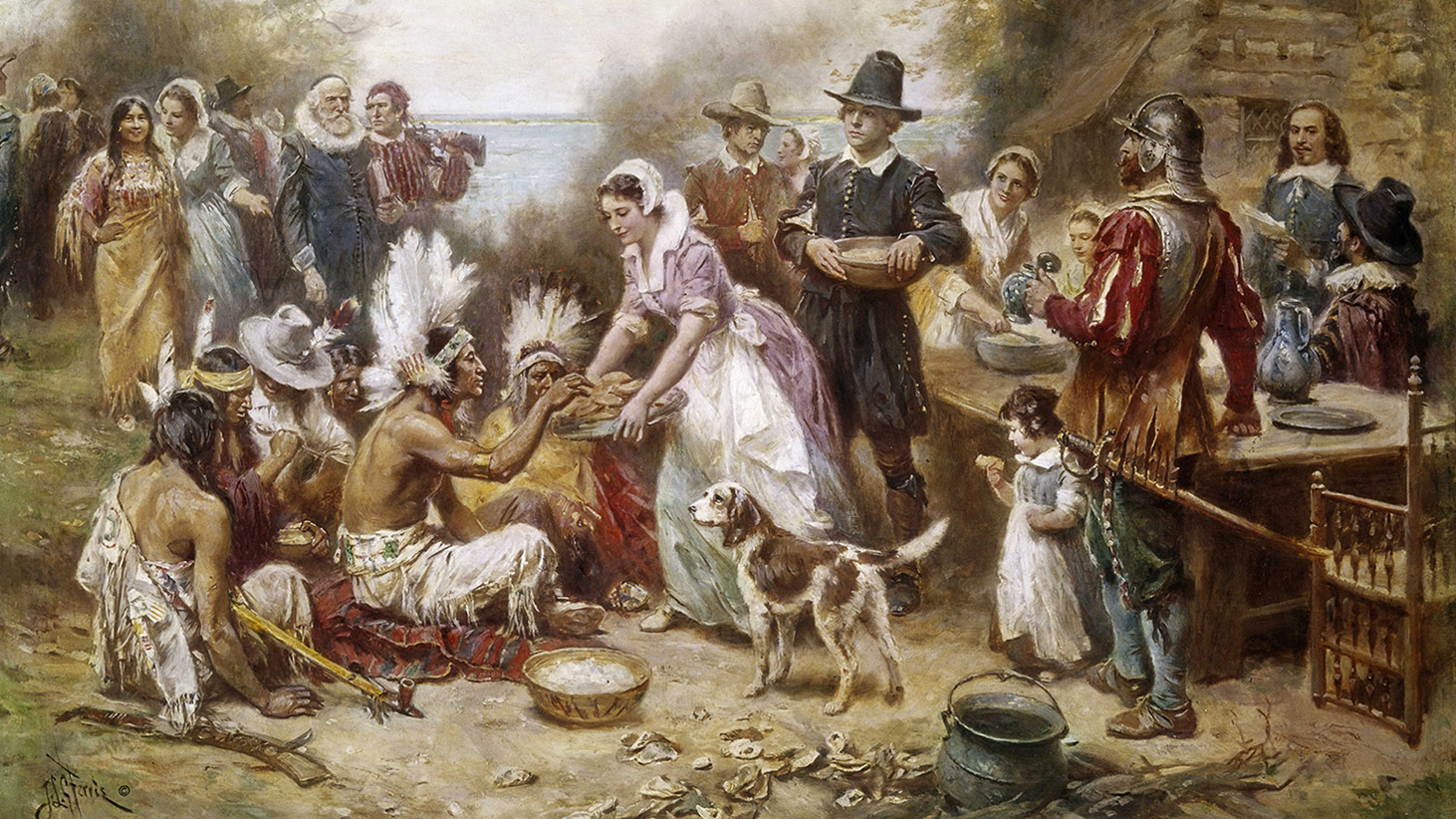
“Our harvest being gotten in, our governor sent four men on fowling, that so we might after a special manner rejoice together, after we had gathered the fruits of our labors; they four in one day killed as much fowl, as with a little help beside, served the company almost a week, at which time amongst other recreations, we exercised our arms, many of the Indians coming amongst us, and amongst the rest their greatest king Massasoit, with some ninety men, whom for three days we entertained and feasted, and they went out and killed five deer, which they brought to the plantation and bestowed on our Governor, and upon the Captain and others. And although it be not always so plentiful, as it was at this time with us, yet by the goodness of God, we are so far from want, that we often wish you partakers of our plenty.”
And the Lord of hosts will prepare a lavish banquet for all peoples on this mountain;
A banquet of aged wine, choice pieces with marrow,
And refined, aged wine.
7 And on this mountain He will swallow up the covering which is over all peoples,
Even the veil which is stretched over all nations.
8 He will swallow up death for all time,
And the Lord God will wipe tears away from all faces,
And He will remove the reproach of His people from all the earth;
For the Lord has spoken.
Massachusetts Bay:
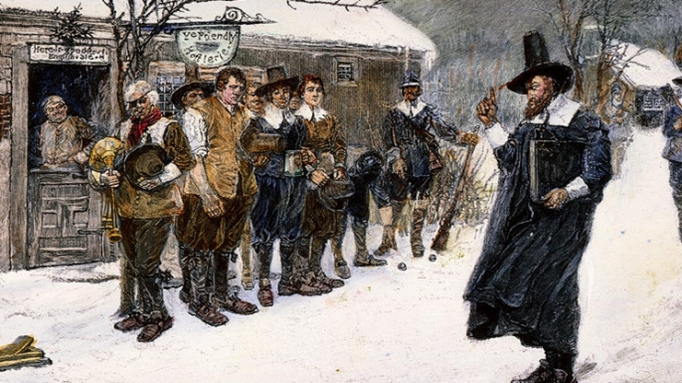
Less famous than the Mayflower was the Arbella, the lead ship of a flotilla of seven ships led by John Winthrop, which would become the Massachusetts Bay Colony in 1630. Winthrop had a commission from King Charles I, son of James, and therefore Puritans who had not entirely given up on the Church of England. When they made landfall, Winthrop gave a sermon. It left no doubt to the fundamental religious intentions behind the colony’s existence and the hope of the godly community there were creating. Said Winthrop, “We are entering into a covenant with God for this work … For this end, we must be knit together, in this work, as one man … We must delight in each other; make others’ conditions our own; rejoice together, mourn together, labor and suffer together, always having before our eyes our commission and community in the work, as members of the same body … We must consider that we shall be as a city upon a hill. The eyes of all people are upon us.”
It was an audacious statement under the circumstances. Here they were, countless miles away from anyone or anything that was familiar to them, having just crossed a vast and turbulent ocean, cut off from the civilized world and stranded by their own choice, looking out at a land that must have seemed like little more than an inhospitable wild land to them. These were not reckless adventurers but pious families, most of them comfortably situated middle-class people from East Anglia. They might as well have been landing on the surface of the moon. No one was watching; no one could know what they were doing. There had to be more than one who upon landing in Massachusetts wondered for a moment if it had not all been an act of madness.
The Massachusetts Bay Colony would be very successful eventually.
Was it religious pride or humility? Was it pride to think they could create a community that was a city on a hill, according to Jesus’ famous Sermon, or was it humility of a people choosing to subordinate their selfish desires to the accomplishment of their mission: to make a godly place in the New World, for the sake of the renewal of the Old.
In Virginia, the motives for settlement were largely material ones, while in Massachusetts Bay, they were frankly religious ones. That is not to say that there were no religious people in Virginia and no greedy merchants in New England, but in general that is how they contrasted. These were two different ways of understanding and pursuing the “good life.”
When the colonies were consolidated in what would become Massachusetts and Connecticut, theological issues arose as they always do. Many Puritans still practiced infant baptism, but their belief that conversion was an experience made some of them wonder what infant baptism really meant. Would it not be better to wait until a person had the experience of conversion and then baptize them? But this clashed with the Puritan goal of founding society that was a Christian commonwealth, as in ancient Israel, and therefore one has to become a member by birth. It was necessary to baptize the “children of the covenant,” in a manner of Jewish circumcision in ancient Israel.
But what was to be done about those who never had a conversion experience? How would they safeguard the purity of life and doctrine throughout the community?
In Salem, MA in 1692, on the basis of idle accusations of some young girls, rumors began circulating that witchcraft was widely practiced in Salem, and the rumors eventually grew into hysteria. In total, twenty people - fourteen women and six men - were hanged, and several others died in prison. When accusations grew so wild that some wealthy merchants, respected members of the clergy, and the governor’s wife were accused, the authorities decided it was time to stop the investigations.
Rhode Island:
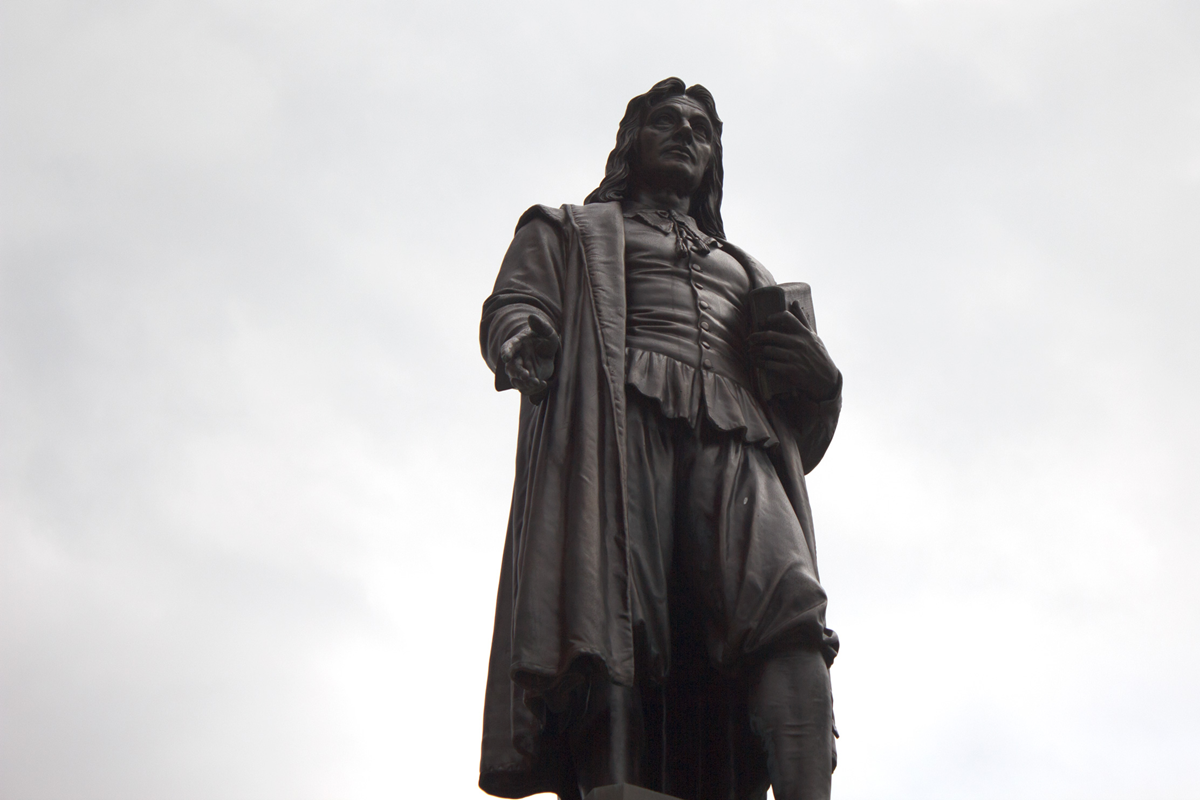
In New England, the intense rigors of a religiously formed regime, rather than individual choice, that Winthrop sought to establish naturally created friction and dissidents. A particularly intense Puritan minister by the name of Roger Williams argued that church and state should be kept completely separate, and that neither Massachusetts or any other government had the right to coerce mane’s consciences in matters of faith.
Williams arrived in MA in 1631. Because of his distaste for the power of the civil authorities being granted power to enforce commands that had to do with an individual’s relationship with God, he refused to serve as pastor in Boston. He moved to Plymouth and became a pastor in Salem. But when he attempted the secession of his church, the authorities of MA expelled him. He settled south of there and founded the colony of Providence on the principle of religious freedom.
We must be free to worship in faith, not coerced. Give thanks for your freedom while you have it. Give thanks when you lose it.
The Lord is the portion of my inheritance and my cup;
Thou dost support my lot.
6 The lines have fallen to me in pleasant places;
Indeed, my heritage is beautiful to me.
(Salem to Providence: Providence to Salem)
Rhode Island was a place for asylum for dissenters.
“God requires not a uniformity of religion to be enacted and enforced in any civil state, which enforced uniformity, sooner or later, is the greatest occasion of civil war, ravishing of conscience, persecution of Christ Jesus in his servants, and of the hypocrisy and destruction of millions of souls.” [Roger Williams]
According to Williams, such freedom was required as part of the very obligation to worship God. Worship must be sincere, and all efforts to force it actually weaken it.
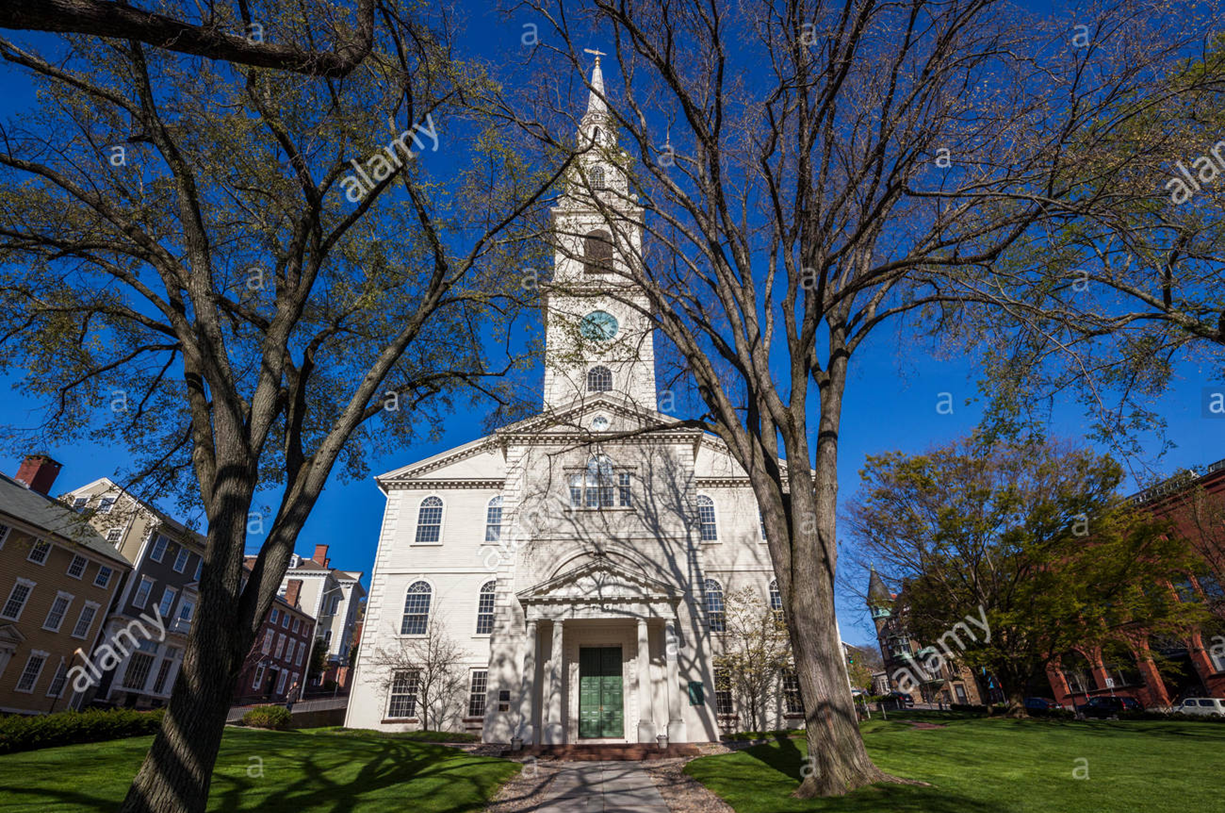
William’s church in Providence eventually became Baptist. One of its members baptized Williams who then baptized others. Unfortunately, William’s ideas became increasingly radical and his gospel decreasingly dependent on the work of Christ. Ultimately, he rejected the idea of churches all together and concluded that the Bible had to be interpreted in purely spiritual terms rather than literally.
Never move outside the boundaries of the truth, no matter what it looks like on the other side.
It is the ironic side of being a land of hope. Being a land of hope, at times, may also mean a land of disappointment. The history of the United States contains both. You can’t have one without the other. Yet it shows us clearly that the human condition has a part that is the desire to realize one’s hopes. It is a spark in the human spirit, every bit as precious as life itself. Colonial life was experimental, and even when experiments fail, something important is learned from them.





